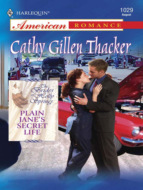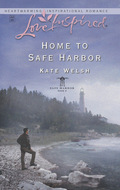Czytaj książkę: «A Bride for Dry Creek»
Francis still didn’t understand what had happened.
One minute she’d been looking up at the night sky, searching for the tail star of the Big Dipper. The next minute she’d felt someone put an arm around the small of her back. She hadn’t even been able to turn around and see who it was before another arm went behind her knees and she was lifted up.
Suddenly, instead of the night sky, she was looking square into the face of Flint Harris. For a second she couldn’t breathe. Her mind went blank. Surely it could not be Flint. Not her Flint. She blinked. He was still there.
Oh, my Lord, she suddenly realized. It’s true. And he’s kidnapping me!
JANET TRONSTAD
grew up on a small farm in central Montana. One of her favorite things to do was to visit her grandfather’s bookshelves, where he had a large collection of Zane Grey novels. She’s always loved a good story.
Today Janet lives in Pasadena, California, where she works in the research department of a medical organization. In addition to writing novels, she researches and writes nonfiction magazine articles.
A Bride for Dry Creek
Janet Tronstad

Set me as a seal upon thine heart, as a seal upon thine arm: for love is strong as death…. Many waters cannot quench love, neither can the floods drown it….
—Song of Solomon 8:6-7
Dedicated with love To my two brothers and their wives Ralph and Karen Tronstad Russell and Heidi Tronstad May God be with all of you Now and forevermore.
Dear Reader,
I should have my mother write you this note. She, having raised five usually wonderful children (of which I am blessed to be one), knows far more of the hope that goes into love than I do. Actually, most mothers know that kind of hope—the hope that their love will bear fruit, that their love will ease someone’s pain and that it will even give that person an anchor in life.
Love laced with hope is a useful kind of love. It sees beyond the romantic parts of love and looks to the future.
That’s why, when I chose to tell the story of Francis, I knew it had to be a story of hope. We never know when we love someone what our hopes will bring. Francis did not know. Flint did not know. Only God knew.
May this story of Francis and Flint encourage you to love with hope and to trust God for a happy ending.

Contents
Chapter One
Chapter Two
Chapter Three
Chapter Four
Chapter Five
Chapter Six
Chapter Seven
Chapter Eight
Chapter Nine
Chapter Ten
Chapter Eleven
Chapter Twelve
Chapter Thirteen
Chapter One
A single fly buzzed past Francis Elkton and swooped up to the bare lights that hung from the rafters of the old barn. Francis didn’t notice the fly, but on most nights she would have even though her eyes were now half-closed as she slow danced to an old fifties tune.
Francis was an immaculate housekeeper. And a first-class manager. She often said, in her job with the City of Denver, that the two went hand in hand. You only needed to look in someone’s top desk drawer, she’d say, to predict what kind of a city manager they would be. Whether it was paper clips or people or drainage pipes, everything needed an order.
She would never have tolerated an out-of-place fly if she hadn’t been so distracted.
But tonight, the fly was only one more guest at the wedding reception, and Francis was too busy trying to keep her unwanted memories in their place to give any attention to the proper place of a mere insect. Every time she opened her eyes she realized that things were not turning out the way she had planned.
She’d taken a three-month leave from her job and come back to Dry Creek, Montana, because she thought she’d be able to stand up to her past—to look her memories of Flint L. Harris square in the eye—and be free of him once and for all. She was mentally cleaning out her files, she told herself. Throwing away outdated papers. Putting her life back in order even if it had taken her twenty years to face the task.
The only reason she’d decided to do it now was that Sam Goodman, her neighbor in Denver, had said he would not wait forever to marry her. She’d realized suddenly that she could not give her heart to Sam, or any other man, until she got it completely back from Flint.
It had been a sentimental decision to come back to Dry Creek to purge herself. She reasoned that the memories had started here in this ranching community, in the shadows of the Big Sheep Mountains. And they would surely end here if she just screwed up her mind and willed them to be gone. It was like reaching deep inside herself to pull out the roots of an unwanted weed that had refused to die over the years.
But, for the first time since she’d come back, she realized her heart wasn’t bending to her will. The past had not grown dimmer because she’d stood up to it. No, the past was right here before her in living color whether she wanted to see it or not.
The pink crepe paper streamers coming down from the rafters were the same color her high school class had used twenty years ago for their prom. Back then her classmates had gone to Miles City to school and had decorated the gym there with their streamers.
Tonight, the dance was being held in the large old barn her brother Garth had built for loading cattle. He had not used the barn for his cattle for several years now, and the community of Dry Creek had scrubbed it clean for their annual Christmas pageant some months ago. On a cold winter night like tonight, the inside of the barn shone bright and the windows were covered with frost.
Dry Creek was fast making the barn into an informal center for all kinds of occasions. Like tonight’s dance to celebrate the wedding of Glory Becker and Matthew Curtis. The dance wasn’t a prom, but the music was the same. The same swaying music. The same soft laughter of other couples in the background.
Francis could close her eyes and almost imagine it was Flint who held her in his arms. Flint with his shy halting gladness to see her and the tall wiry length of his twenty-year-old body. Even back then, she should have known that dancing with him would come to no good
“Francis?” A slightly alarmed man’s voice growled in her right ear.
Francis blinked and then blushed. Jess, one of her brother’s older ranch hands, had invited her to dance, and it was his face that now looked at her suspiciously. She hadn’t realized until he spoke that her arms had crept up his back until she had him in an embrace that was more than friendly. She shook the memories from her eyes, cleared her throat and loosened her arms. “Sorry.”
“That’s okay.” Jess ducked his head, apparently reassured once the sensible Francis was back. Then he added teasingly, “After all, your brother did tell me to stick close to you tonight.”
“He’s not still worried about that phone call?” Francis gladly diverted the conversation to her brother’s needless caution. “Just because some guy calls up and says someone might be out to kidnap me—it’s all nonsense anyway. Even if Garth did know something about the rustlers who have been hitting this area—which he doesn’t—well, it doesn’t make sense. Before they start making any threats, these rustlers should find out if Garth knows anything that’s a danger to them. Any manager would tell them that’s the first step. They might be criminals, but that’s no excuse for sloppy planning. You need to identify your problem and then verify how big it is before you can even hope to solve it.”
“Way I hear it, it wasn’t just some guy that called.”
Apparently Jess only heard the first part of what she’d said. Francis had noticed that the ranch hands who worked for her brother tended to let their eyes glaze over when she tried to teach them management techniques.
“The man never gave his name,” Francis corrected stiffly.
“Didn’t need to from the way I heard it,” Jess mumbled. “Begging your pardon for mentioning him. Still—can’t be too careful.”
No wonder she was having so much trouble getting rid of her memories of Flint, Francis thought. He seemed to have more lives than a stray alley cat. She’d bury him one day and he’d be resurrected the next. Did everyone in Dry Creek know about that phone call?
“I don’t believe it was Flint Harris on the other end of that phone call. For pity’s sake—he probably doesn’t even remember Dry Creek.” Lord knows he doesn’t remember me, Francis added silently. “He never had roots in Dry Creek. He only came here that one spring because his grandmother was ill. He hasn’t been back since she died.”
“Hasn’t sold her place yet, though,” Jess argued. “Even pays taxes on it. That’s got to mean something.”
“It means that it isn’t worth selling. Who would buy it? The windows are all broken out and it’s only got five acres with it. The only thing you could raise there is chickens and with the low price of eggs these days—”
Francis stopped herself. She didn’t need to be her own worst enemy. She needed to forget chickens. That had been their adolescent dream—that they would live with his grandmother and make their living by selling eggs. A fool’s dream. Even back then, it wouldn’t have kept them in jeans and tennis shoes. She cleared her throat. “The point is that Flint Harris is nowhere near here.”
“Like I said, I’m sorry to bring the louse up. If I’d have been here back then and met the boy, I’d have given him a good speaking to—treating a nice girl like you that way.”
Francis stopped dancing and looked at Jess. He seemed to expect a response. “Well, thank you, but that wouldn’t have been necessary. I could take care of myself even back then.”
“If you say so.”
Francis looked at him carefully. There it was. A steady gleam of pity in his eyes.
“Those rumors are not true.” Francis bristled. The one thing she didn’t miss in Denver was the gossip that flowed freely in a small community. “While it is true that he and I drove to Las Vegas after the prom and looked for a justice of the peace, it is not true that we were actually married.”
“Mrs. Hargrove says—”
“Mrs. Hargrove wasn’t there. I was. The man was not a justice of the peace. My father called down there and asked. They had no justice of the peace by that name. It doesn’t matter what words we said, those papers we signed were worthless.”
“You signed some papers?” The pity left his eyes. It was replaced by astonishment. “You still have them?”
“I didn’t say I have papers,” Francis said patiently. The last time she’d seen those papers, Flint had had them. She remembered the way he had carefully folded them and put them in his coat pocket. She hadn’t realized at the time that any young bride with any sense asks to keep the papers herself—especially when the wedding takes place in Las Vegas. That should have been her first clue.
“Besides, that is long ago and done with,” Francis said briskly. “As Mrs. Hargrove probably told you, even if it had been a marriage, it would have been the shortest marriage ever on record in Dry Creek—probably the shortest in all of Montana. I don’t even think it lasted forty hours. We had the trip back from Vegas and then he dropped me off at my dad’s to pack. Said he was going to Miles City to buy me some roses—every bride needed roses, he said—those were the last words I ever heard from him. He never came back.”
Francis believed in slicing through her pain quickly and efficiently with a minimum of fuss. She’d held her breath when she recited the facts of those two days with Flint and now she let it out slowly. “I’m sure it was one of the smoothest exit lines in the book and I fell for it. Five weeks later I made arrangements to graduate early from high school and I left for Denver. That’s all there was to it.”
“But no one knew,” Jess reproached her softly. “That’s the only reason the folks here still remember it. No one but your father knew and then you just left so suddenly. These were your neighbors and friends. They cared about you, they just didn’t know what was happening. Even now Mrs. Hargrove keeps trying to think back to something she could have said to make it better in those days for you—blames herself for not taking a more motherly role in your life—what with just you and your dad out there alone when Garth was in the service—keeps having this notion that Flint did come back in around that time and stopped at her place to ask for you.”
“She’s confused,” Francis said flatly. People meant well, but it didn’t help to sugarcoat the truth. “If he’d tried to find me, he’d have tried my father’s place. He knew where it was. He’d been there enough times.”
“I suppose you’re right.”
The dance ended and suddenly Francis felt foolish to be standing there arguing about whether or not a man had stopped to see her neighbor twenty years ago. “I think I’ll sit the next one out if it’s all the same to you. You can tell my brother I’ll be fine. I’ll just be taking a rest.”
Jess looked relieved. “I could use a break myself. My arthritis is acting up some.”
“Well, why didn’t you say so? We could have sat the last two dances out—no need to be up and moving around on a cold night like this.”
“It is a blistering one out tonight, isn’t it?”
“All the more reason to forget about the kidnapping threat,” Francis agreed. “No one but a fool would be out setting a trap tonight. It’s too cold. No, I think the kids are right when they said it was that rival gang they have in Seattle calling to make mischief.”
Francis’s brother, Garth, had offered the use of his ranch to a woman who ran a youth center for gang kids in Seattle. At the moment, thirty of the kids were learning to be better citizens by spending a few weeks in Dry Creek, Montana. Garth had been in charge of teaching the boys how to be gentlemen, and Francis had been astonished at his patience. He’d had them out in the barn practicing how to dip and twirl their dance partners, and the boys had loved it.
A rich society woman from Seattle, Mrs. Buckwalter, was underwriting the cost of the trip to Montana, and Francis couldn’t help but notice how excited the older woman was tonight. Mrs. Buckwalter couldn’t have been prouder of the teens if she’d given birth to every one of them.
And Francis couldn’t blame her. The teenagers sparkled at this dance, the boys in their rented tuxedos and the girls in the old fifties prom dresses they’d borrowed from the women of Dry Creek. It was hard to believe that they were members of various gangs in Seattle. A few dance lessons and a sprinkling of ties and taffeta had transformed them.
“That’s really the logical explanation,” Francis concluded. If the other gang could only see the youth center kids now. She couldn’t help but think they’d be a little jealous of the good time these kids were having.
“Maybe.” Jess didn’t look convinced. “Just don’t take any unnecessary risks—your brother will have my hide. He’s worried, you know—”
“Even if Flint did kidnap me, he’d never hurt me—no matter what Garth worries about.” As Francis listened to herself saying the words, she realized how naive she sounded. She didn’t know what kind of a man Flint might be today. She’d often wondered.
Jess looked at her. “Still, things happen.”
“What could happen?” Francis waved her arms around. She might not know about Flint, but she did know about the people of Dry Creek. At least a hundred people were in the barn, some sitting on folding chairs along the two sides, a few standing by the refreshment table and dozens of them on the floor poised ready to dance to the next tune. A lot of muscle rested beneath the suits that had been unearthed for this party. “One little scream and fifty men would come to my rescue. I’m surrounded by Dry Creek. There isn’t a safer place in all the world for me.”
Jess grunted. “I guess you’re right. Maybe you should go visit with Mrs. Hargrove a bit. Talk to those two little boys that belong to Matthew Curtis. Find out how they like the idea of having a new mama.”
Francis smiled. She was fond of the four-year-old twins and liked to see them so happy. “Everyone knows how they feel about that. She’s their angel.
If their dad wasn’t going to marry Glory, I think they’d wait and marry her themselves.”
Meanwhile, outside in the dark…
Flint watched a fly buzz up to the headlight of the old cattle truck. Now, what was a fly doing in the middle of a Montana winter night so cold a man’s nose hairs were likely to freeze?
Flint slid into the niche between two cars and hunched down in his black leather jacket. The worthless jacket was nearly stiff. That fly didn’t belong here any more than Flint and his jacket did. He would bet the fly had made the mistake of crawling into that cattle truck when it’d been parked someplace a lot warmer. Say Seattle. Or San Francisco.
Even a rookie FBI agent would make the connection that the truck didn’t belong to anyone local. And Flint had been with the Bureau for twenty years. No, the truck had to belong to the three men he’d identified as cattle thieves. He’d call in their location just as soon as he had something more concrete to tell the inspector than that he’d listened to them talk enough to know they were brothers.
The last time he’d made his daily check-in call, one of the guys had said the inspector was grumbling about him being out here on this assignment without a partner. Flint told him he had a partner—an ornery horse named Honey.
The fly made another pass close to Flint’s face, seeking the warmth of his breath.
Flint half-cursed as he waved the fly away. He didn’t need the fly to distract him from the mumbled conversation of the three men. They’d been standing in front of the cattle truck arguing for several minutes about some orders their boss had given to deliver a package.
Flint sure hoped they were talking about which cattle to steal next.
If not, that probably meant his tip was accurate and they were planning to kidnap Francis Elkton. He hoped Garth had taken the phone call he had made seriously and was keeping Francis inside, in some controlled area with no one but the good ladies of Dry Creek around her.
Flint envied all of the people of Dry Creek the heat inside the barn. The warmest he was likely to get anytime soon was when he went to feed Honey some oats.
It hadn’t taken him more than a half hour on Honey’s back to realize that her owner must have had a chuckle or two when he named her. She was more sour than sweet. Still, Flint rubbed his gloved hands over his arms and shivered. Honey might be a pain, but he missed her all the same. She was the only breathing thing he’d talked to since he came to Montana.
By now Honey would be wondering when they’d go home. When he’d ridden her to town tonight, he’d tied her reins to a metal clothesline pole in a vacant lot behind Mr. Gossett’s house. The pole was out of the wind, but Honey would still be anxious for warmer quarters. Last night, he’d bedded her down in an abandoned chicken coop that still stood on the farm he’d inherited from his grandmother when she died fifteen years ago. As far as he knew, no one but gophers ever visited the place anymore.
He was half-surprised the men hiding by that cattle truck didn’t use horses. The terrain on the south slopes of the Big Sheep Mountain Range wasn’t steep, but it also wasn’t paved. There were more fences than roads. The long, winding strings of barbed wire and aging posts did little in winter except collect snowdrifts. Flint had followed a dozen of those fences to reacquaint himself with the area last night and didn’t see anything more than a thick-coated coyote or two.
But then these men probably didn’t know how to ride a horse. Which meant they weren’t professionals. If they had been pros, they would have learned before heading out here on a job like this. A pro would realize a horse would be a good escape option if the roads were blocked. Yes, a pro would learn to ride. Even if he needed to learn on a bad-tempered horse like Honey.
Flint’s observations of the men had already made him suspect that they were not career kidnappers. They were too careless and disorganized to have lived long if they made a habit of breaking the law. But Flint knew that the crime syndicates liked to use amateurs for some jobs—they made good fall guys when things went sour.
Granted, the Boss—and the Bureau didn’t know who he was yet—had other reasons to use amateurs here. A pro would look so out of place in this rural community he might as well wear a red neon sticker that said Hired Killer—Arrest Me Now.
The fact that the men were too tender to ride horses made Flint hope that they would give it up for tonight and go home. The night was clear—there was enough moonlight so that Flint could see the low mountains that made up the Big Sheep Mountain Range. But it was ice-cracking cold and not getting any warmer.
The little town of Dry Creek stood a few miles off Interstate 94, which ran along the southern third of Montana from Billings on through Miles City. The town was nothing more than a few wood frame houses, an old square church, a café called Jazz and Pasta that was run by a young engaged couple, and a hardware store with a stovepipe sticking up through the roof. The pipe promised some kind of heat inside. Flint had not gone in to find out if the old Franklin stove he remembered was still being used. He hadn’t even tried to find an opening in the frost so he could look in the window.
The memories Flint had of his days in Dry Creek were wrinkled by time, and he couldn’t be sure if all the details like the Franklin stove were true or if he’d romanticized them over the years, mixing them up with some old-fashioned movie he’d seen or some nostalgic dream he’d had.
He realized he didn’t want to know about the stove so he hadn’t looked inside the hardware store.
Flint had only spent a few months in Dry Creek, but this little community—more than anywhere else on earth—was the place he thought of as home. His grandmother had lived her life here, and this is where he’d known Francis. The combination of the two would make this forever home to him.
None of the chrome-and-plastic-furnished apartments he’d rented over the years could even begin to compete. They were little more than closets to keep his clothes out of the rain. He couldn’t remember the last time he’d cooked anything but coffee in any of them. No, none of them could compete with the homes around Dry Creek.
Even old man Gossett’s place looked as though it had a garden of sorts—a few rhubarb stalks stuck up out of a snowdrift, and there was a crab apple tree just left of his back porch. There were no leaves on the tree, but Flint recognized the graceful swoop of the bare branches.
The trash barrel that the man kept in the vacant lot had a broken jelly jar inside. Flint suspected someone was making jelly from the apples that came off the tree. It might even be the old man.
Flint envied the old man his jelly and Flint didn’t even like jelly. The jelly just symbolized home and community for him, and Flint felt more alone than he had for years. Maybe when he finished this business in Dry Creek, he should think about getting married.
That woman he’d started dating—Annette—he wondered if she could make apple jelly. He’d have to find out—maybe he should even send her a postcard. Women liked postcards. He hadn’t seen any that featured Dry Creek, but maybe he’d stop in Billings when this was all over. Get her something with those mountains on it. In the daylight the Big Sheep Mountain Range was low and buff-colored with lots of dry sage in the foreground. Looked like a Zane Grey novel. Yes, a postcard was a good idea. That’s what he’d do when this was all over.
From the sounds of the ruckus inside that old barn, the whole community of Dry Creek, Montana, was celebrating tonight. All eighty-five adults and the usual assortment of children.
Flint had checked the vital statistics before he headed down here. The place didn’t have any more people now than it had had that spring he’d spent at his grandmother’s place. The only new people that had come to the community were the busload of Seattle teenagers who were there for a month to see that all of life wasn’t limited to the city streets. As long as Francis stayed with the people inside the barn, she would be safe.
That thought had no sooner crossed his mind than the side barn door opened. A woman stood silhouetted in the golden light from inside the barn. Flint felt all breath leave his body. It was Francis.
Francis let the winter air cool her. The ruby red material of her dress was thin, but it had still suddenly gotten much too hot inside the barn. The rumor that Flint had been the one who made the phone call to Garth this afternoon had opened up all of the speculation about her and Flint. She saw it in the eyes of her neighbors. They were asking themselves why she’d never married, why she’d moved away so quickly all those years ago, why she’d never come back to live in Dry Creek until now—why, why, why. The questions would be endless until they’d worried her heart to a bone.
She only wished the asking of the questions would help her find an answer, she thought ruefully. Because, even if no one else had been asking those questions, she would be asking them.
But not tonight, she decided. Tonight she would just breathe the crisp night air and look at the stars that were scattered across the sky like pieces of glitter sprinkled over velvet. She used to love to go out on a winter’s night like this and find the Big Dipper.
Now where is it, she asked herself as she stepped through the open door and outside. The barn was hiding the constellation from her. But if she went over by that old cattle truck she could see it.
She suddenly realized she hadn’t gone looking for the Big Dipper in many years.
Flint swore. No wonder being a hero had gone out of style. His leg still stung where Francis had kicked him in her glittery high-heeled shoes, and one of his toes could well be broken where she had stomped on it.
Next time, he’d let the kidnappers have her. She was more than a match for most of the hired toughs he’d seen in his time. She’d certainly hold her own with the men in the cattle truck.
And thinking of his toes, what was she doing with shoes like that, anyway? Women only wore shoes like that to please a man. That meant she must have a boyfriend inside that old barn. That was one statistic he hadn’t thought to check before heading out here.
Flint’s only consolation was that his horse seemed to know he needed her and was behaving for once.
“Now I know why they call you Honey,” Flint murmured encouragingly as he nudged his horse down the dark road.
“Hargh.” An angry growl came from the bundle behind him, but Flint didn’t even look back. Except for being temporarily gagged, Francis was doing better than he was. He’d even tied his jacket around her. Not that she had thanked him for it.
“Yes, sir, you’re a sweetie, all right,” Flint continued quietly guiding his horse. Honey knew the way home even if it was only a humble abandoned shed. That horse could teach some people the meaning of gratitude.
Or, if not gratitude, at least cooperation, Flint fumed.
If it wasn’t for his years of training as an agent, Flint would have turned around and told Francis a thing or two. What did she think?
There was no time for niceties when he knew those two hired thugs were waiting for Francis. He’d heard them repeat their instructions about kidnapping Garth’s sister in her black jacket with the old high school emblem of a lion.
Early on in the evening, the two men made a decision to wait for her by the bus—parked right next to that old cattle truck they’d come in. They hoped Francis would tire of dancing and come to sit in the bus. Flint had winced when he heard the plan. The two men were clearly amateurs, unfamiliar with Montana. No one, no matter how tired, would come to rest in a cold bus when the engine wasn’t running.
But he saw their dilemma. They couldn’t face down the whole town of Dry Creek or even the busload of kids that would be going back to the Elkton ranch. That’s why he wasn’t surprised, after the men had waited a few hours and gotten thoroughly cold themselves, to hear them start talking about going home and waiting until the next day to kidnap Francis.
Flint was hoping they’d leave soon. And they would have, except who should come outside for a late night stroll but Francis. She wasn’t wearing the black jacket, but Flint couldn’t risk the thugs getting a close look at her and realizing who she was, even without the jacket.
There was no time for fancy plans. The only way to protect Francis was to grab her first and worry about the men later.
Flint knew the men might be a problem if they realized what he was doing, but he hadn’t counted on Francis’s resistance. He thought once she knew it was him she’d come quietly. Perhaps even gratefully. But the moment he saw recognition dawn, she fought him like he was her worst enemy. He hadn’t planned on gagging her until she made it clear she was going to scream.
And all the while she was kicking and spitting, he’d been doing her a great service.
Yes, he sighed, he could see why being a hero had gone completely out of style. It wasn’t easy being the knight on the shining white horse. Not with the women of today. Come to think of it, it wasn’t even easy with the horses of today. Honey made it clear she’d rather be eating oats than rescuing a damsel in distress.
“Tired, that’s what you are,” Flint said softly as he leaned over the horse’s neck. Honey sighed, and he gave the horse another encouraging nudge. “We’re both tired, aren’t we? But don’t worry. We’re almost there. Then I’ll have something sweet for you.”








